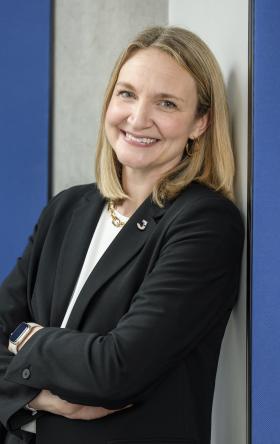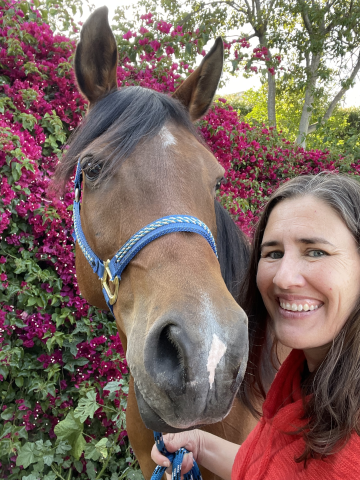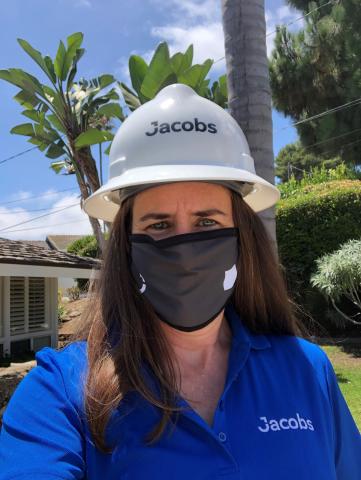Sometimes, small actions can create a significant impact. These tiny acts can turn into ripples, even leading to a movement. The Ripple Effect is something Jacobs Senior Project Manager Renee Groskreutz weaves into every aspect of her role, from educating others to understanding the role everyone plays in a successful project. We sat down with Renee to discuss her passion for water, project management and the ripples she makes every day.
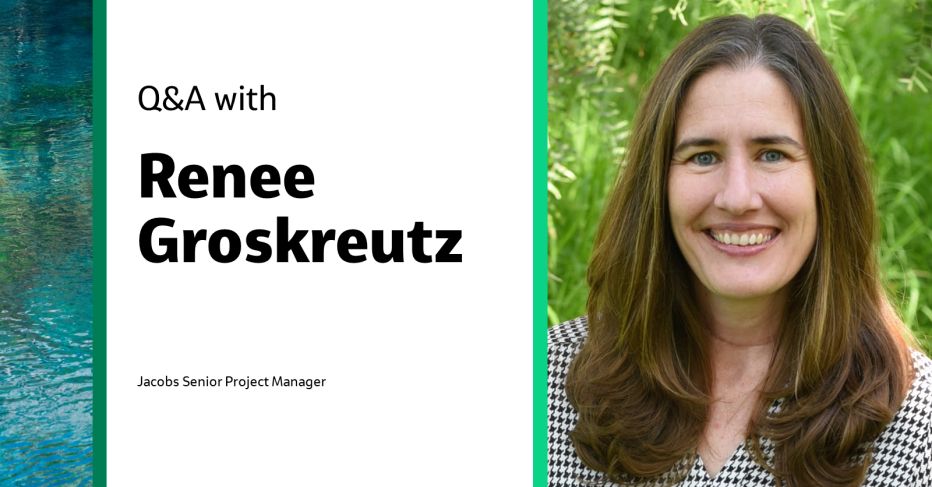
What sparked your passion for working in the water industry?
I had been drawn to civil engineering from a young age because I was fascinated with infrastructure. I noticed and appreciated the power, water, roads and bridges that supported the different communities where I grew up. I have lived in Texas, South Carolina, Ohio, New York, Louisiana, Missouri, Texas, North Carolina and of course, California – each state bringing its unique approach to tackling infrastructure challenges.
More specifically, my passion for water sparked in college when I realized the sciences I am interested in, such as chemistry, biology, and physics, are all a part of water treatment. It’s been incredible to be a part of such an exciting industry and serve a greater purpose of stewardship and sustainability.
Tell us about your professional journey with Jacobs.
Interestingly, it almost feels like Jacobs has been chasing me my entire career. My first job was at Sverdrup Civil, Inc in St. Louis. Right after I left to pursue my graduate degree in California, Jacobs acquired Sverdrup. Similarly, after completing my master’s degree, I joined CH2M HILL, Inc. in our southern California office, which Jacobs acquired during my career break to raise my family.
Once I decided to return to the water industry, I knew that it had to be with Jacobs. I called my colleagues at Jacobs, and it felt like returning home to great people and work. I finally let Jacobs catch me; I’m so glad I did.
What is the favorite part of your current role?
The people. I greatly respect my colleagues and our clients' incredible intellect, integrity and drive. As project manager and deputy program manager, I have the honor of building teams and empowering individuals. In water projects, we face real-world problems such as drought and the sustainability of these communities. It's my job to identify, engage and motivate each team member to solve problems creatively and efficiently while building trust, clarity and understanding as a team. I am proud to work in the water industry in southern California at this time and with these people.
What makes a good program manager?
There are three things a good program manager needs. First, they need to be a clear communicator. Active listening is essential. They need to know what questions to ask and how to give timely, informed and thoughtful responses.
Second, they need to be respectful and respected. Each challenging discussion and every milestone achieved can build trust. Bringing a positive and encouraging attitude can lift the team and create space for innovation and creative solutions.
Finally, they need to be calm and strategic. Projects can encounter challenges throughout their lifecycle, and it’s our job to take those storms and turn them into calm seas. Program managers should respond rather than react, engaging the team to manage risk, deliver on schedule and celebrate every win along the way.
“We are all a part of the ripple effect, but we can choose what kind of effect we can have on a project.”
Can you share the most challenging project you’ve been involved with? What made it so challenging and how did you get through it?
Early in my career, I was part of a considerable master planning effort with multiple internal and external stakeholders. I thought I understood the effort's purpose, needs and scope, so I proceeded with all my normal intensity and fervor. When I met resistance or redirection, I kept pushing forward without pausing to reassess and communicate the impact of the change of direction. The master plan was successfully completed, but I learned from this experience the role each person plays in change and risk management and the positive impact of early assessment and mitigation. These are not just risk registers or forms – but critical tools for engaging the team in change management, maintaining high quality, keeping within budget and managing the impacts to schedule. We are all a part of the ripple effect, but we can choose what kind of effect we can have on a project.
As a California local, what regional and environmental impacts do you consider while working on projects for this community?
California has a rich and complicated history when it comes to water. Understanding the region’s history with water rights and usage is essential to understand the underlying perspectives and drivers as we develop and build a new relationship with water. By working together and taking a more holistic view of the water cycle and how we can optimize, we all become better stewards and sustainably support the communities that call this region home. Although the drought has challenged us all, it creates the opportunity to engage in a whole new dialogue to bring our best ideas on protecting, educating and mindfully managing the water usage, reuse and environment in our state.
You mentioned the importance of water stewardship, how are you working to educate people on this critical subject?
I’ve had the opportunity to spend much of my adult life encouraging young people to be excited about water. During my career break, I volunteered in elementary, middle and high schools bringing engineering challenges and talking about water issues. Over the last 11 years, I’ve led large troops of Girl Scouts and shared my water knowledge and leadership skills. I’m passionate about encouraging and modeling positive leadership styles and empowering young people to find their voice and make ripples in their own communities.
Do you have any tips for getting started in water conservation?
Start simple – be curious – learn where your water comes from and where it goes. Then, use that knowledge to inspire you to make simple changes in your daily life. All those drops add up!
If you aren’t working, what would we most likely find you doing?
I love spending time with my family (three kids) and animals (three dogs and a horse.) We enjoy camping, hiking, horseback riding, visiting National Parks, playing board games (we are highly competitive,) chilling out watching an adventure movie, and going on playful adventures near and far.
What do you enjoy most about being part of #OurJacobs?
What I love about Jacobs is the encouragement and support of diversity, courageous conversations, global mindset and personal development. I appreciate that Jacobs offers a depth and breadth of opportunities and the guidance and mentorship to take advantage of them.
About the interviewee
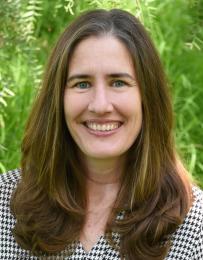
Renee Groskreutz, P.E. is a Senior Project Manager in the Los Angeles office focused on the water reuse market in southern California. She enjoys building teams to deliver programs and individual projects and tasks – seeking to bring viable and cost-effective solutions to her clients. Her passion is matching the right solutions with changing needs, from programmatic services, technical studies, preliminary design, detailed design and services during construction.























